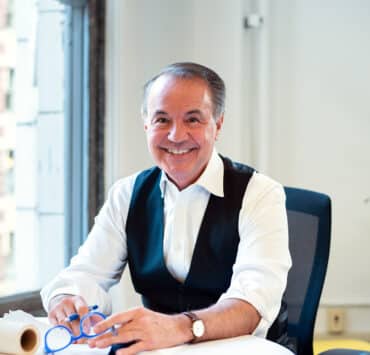|
Getting your Trinity Audio player ready...
|
In an era far too often dominated by superficial conversations about DEI, Marcos Torres brings a breath of fresh air to the diversity, equity, and inclusion dialogue in corporate America.
“In the investment banking industry, being a Latino managing director who is also a group head is akin to being a dinosaur,” says Torres, the managing director of the communications, media, and entertainment group at RBC Capital Markets.
As a Boricua who was raised in New York City’s Spanish Harlem, Torres refuses to euro step past the empty promises that too many executives fail to keep. His parents moved from Puerto Rico to the mainland US in pursuit of el Sueño Americano, and they counted on him to overcome many obstacles, including systemic racism, poverty, and homelessness. The no-nonsense Nuyorican always cuts to the chase, no matter how uncomfortable the topic gets.
“My dad died when I was twelve and my mom died when I was fifteen. As a young Latino kid growing up in Spanish Harlem with no parents in poverty and homelessness, growing up was really uncomfortable,” Torres says. “It just really brought my perspective to an entirely different level, because I wasn’t doing it for me.”
While Torres embarked on an investment banking career just a few blocks south of el barrio, he chalks up his success to being grounded and having perspective. Despite being the only one of his six siblings to get a college education, he uses this as motivation to pay it forward.

“I kind of felt like I was doing it for my community, for my parents, for my siblings, for Latinos. For Latino kids who currently sit in my mindset (as a child) with such despair, sadness, and depression,” Torres says. “I felt like I was going to represent all of those people. Like I was chosen for a greater purpose.”
Even in his role at RBC Capital Markets, Torres does more than just advise or raise capital for Fortune 500 companies. He passionately fights the good fight and expands how RBC’s investment bank approaches DEI. Whether it is cochairing the firm’s Diversity Leadership Council, supporting new recruiting initiatives, or advocating for external DEI partnerships, he challenges the status quo in a traditionally conservative financial services industry.
“Look, it’s constant education,” the executive admits. “It’s educating your colleagues, which means your colleagues need to listen to you, which means they have to respect you. Naturally, you have to excel at your job in order to gain your colleagues’ respect and attention. Once they truly listen, only then can you educate.”
Fortunately, RBC Capital Markets has a corporate culture based on mutual respect and where DEI is more than just a talking point. According to Torres, this is in large part what has kept him at RBC Capital Markets for more than ten years.
As part of its ongoing focus on hiring talented under-represented minorities, RBC Capital Markets has made meaningful investments in its proprietary summer internship programs. These programs include the Women’s Advisory Program, the Pathways Scholarship Program, and the LGBTQ+ Summer Insights Program.
Torres remembers what it was like to be overlooked by recruiters as a college student at Fordham University, so he forges strong partnerships with external organizations that tout diverse talent networks as a way to leverage RBC’s various summer programs and get candidates through the door earlier in their careers.
“I kind of felt like I was [going to college] for my community, for my parents, for my siblings, for Latinos . . . I felt like I was going to represent all of those people. Like I was chosen for a greater purpose.”
– Marcos Torres
“If we’re getting more diverse talent, that diverse talent over time will get higher paying front office jobs,” Torres says. “They will create more wealth and, in theory, that wealth will at least partially trickle back into Latino communities, Black communities, and LGBTQ+ communities. Ultimately, we will address the ‘E’ in DEI.”
Torres sits on the board of the Hispanic Federation, the nation’s premier Latino nonprofit organization focused all on things Latino. As an executive committee member and the organization’s treasurer, Torres has been particularly involved in Crear Futuros (which translates to “Create Futures”), an initiative focused on helping at-risk Latinos complete college by providing peer mentorships, student support services, work-study opportunities, and leadership training. Crear Futuro college students ultimately have opportunities to apply and participate in RBC’s summer internship programs.
“The students get to know us,” Torres says. “We get to know them, and then we make them an offer, and they can join RBC Capital Markets better prepared and feel more included.”
Torres is also a board member at the Ballet Hispánico and the Latino Donor Collaborative. Ballet Hispánico brings communities together to celebrate and explore Latino cultures through innovative dance productions, transformative dance training, and community engagement. Latino Donor Collaborative is dedicated to reshaping the perception of Latinos as part of the American social mainstream.
When push comes to shove, you cannot put Torres in a box. Whether he navigates barrios or boardrooms, he earns respect from others with his hustle and heart. He reaffirms that Latinos have always belonged and are truly a part of the fabric of the American mainstream, across social, arts and culture, and business, and that Latinos have helped shaped the America we all experience it today.
And his colleagues and partners agree. “Marcos has demonstrated tremendous financial acumen and leadership as well as a true commitment to the nationwide Hispanic community,” says Albert Rodriguez, president of the Spanish Broadcasting System. “His expertise and commitment was critical to the successful refinancing of our debt and helping to position SBS for sustainable long-term growth. His partnership has been invaluable, and we are thrilled to recognize his accomplishments and passion for the Hispanic community.”
He shares his advice for executives that are slow to embrace DEI: “Get off your butt!” Torres says. “Time is limited! You don’t wait until you reach some magical point in your career to help others. The future is not guaranteed. We all live on borrowed time, so go help people now!”
Torres adds, “Maybe you don’t do it now as much as you would do it later when you have more time and higher earning power. But do it now and start practicing and flexing the help muscles. Start doing it now so that in twenty years, you’re not thinking about helping people and doing it in some artificial way because you’re so damn disconnected from the community.”

